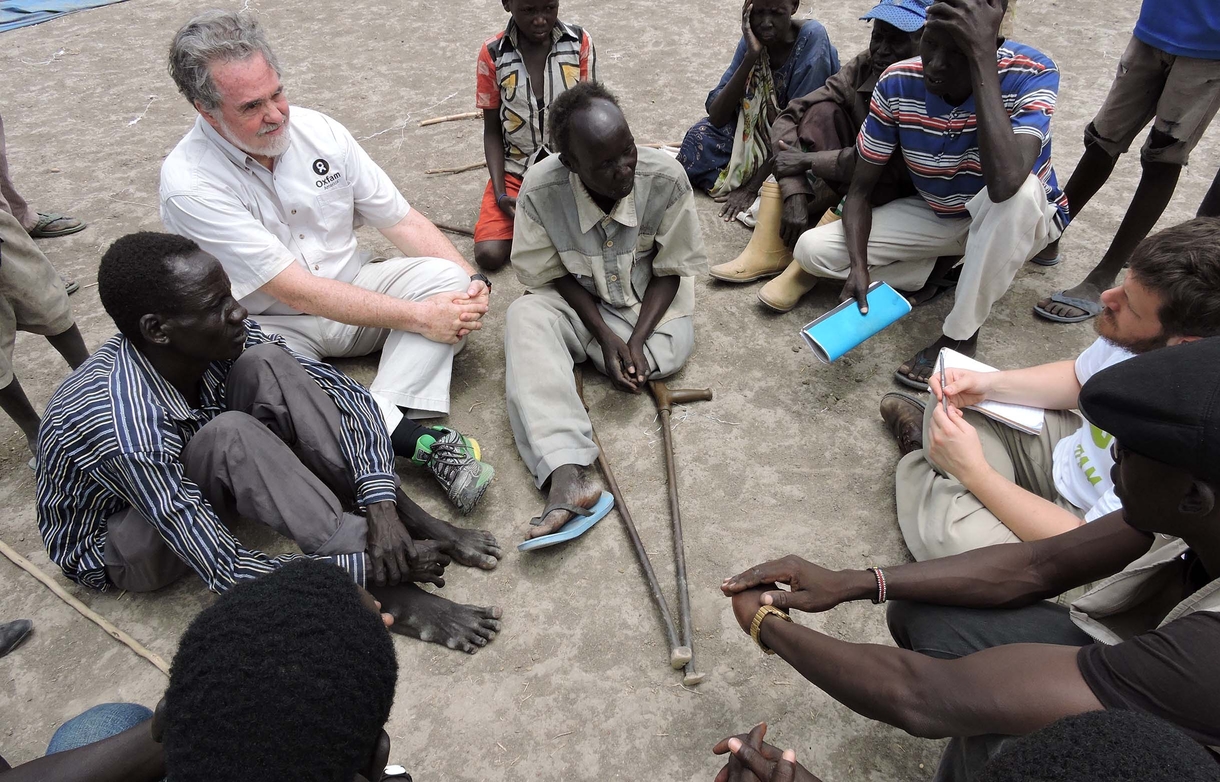Oxfam America’s president reflects on his visit to a country in the grip of a massive hunger crisis.
Peter spoke softly, looking at the ground as he explained how he arrived at this displaced persons camp on the outskirts of Juba, capital city of the world’s newest nation, South Sudan. When fighting started between two government factions in December 2013, Peter found himself in danger because his tribal background led people to assume he supported the opposition. Along with thousands of others, he fled to the safety of this camp inside the United Nations compound. He has stayed here for the last 15 months, unable to contact his family living in the north of the country, fearing that to leave the security of this compound would be to risk his life.
The camp where Peter lives is unusual; it lies within the UN headquarters in South Sudan which houses the country’s large international peacekeeping mission. United Nations soldiers and humanitarian staff from around the world now find themselves living side by side with displaced South Sudanese civilians inside a militarized security perimeter.
In UN parlance, this unique situation is referred to as a Protection of Civilians (PoC) site. There are three such zones within the compound in Juba and five more across the country. From afar, this PoC looks like any other camp for the displaced. There’s a sea of white tents, water tanks, outhouses, crowded medical clinics, and a wide array of NGOs providing basic services. Smiling children running up and down the narrow muddy pathways provide a pleasant backdrop to this otherwise grim scene.
Space is at a premium in the PoC, with the more than 20,000 people who call this place home each cramped into a 10-by-10-foot space to cook, eat, bathe, sleep, and live. Imagine living inside a makeshift shelter with torrential rains soaking your tent and turning pathways into a sea of mud. While challenging, these conditions are much better than the four-by-five- foot tents with which more than 13,000 people have to make do in another camp just around the corner.
This is life for the 115,000 people who call camps like this one home in South Sudan. Many more still need our help.
Since the conflict started, more than 2 million people have had to flee their homes and over 10,000 have been killed in the fighting. The country is in the throes of a massive humanitarian crisis— an estimated 2.5 million are going hungry and that number is expected to rise to 3.5 million by the end of June. One in three children is malnourished.

These grim statistics are hard to fathom unless you see the situation with your own eyes; that’s why I traveled to South Sudan this past week to witness Oxfam programs that have helped nearly half a million people access food, clean water, hygiene facilities, fuel, and income support.
Peter has sadness about him as he reflects on the prospects for peace and the time when he might safely walk through the gates of the PoC compound to rejoin his family. His story was similar to many others I’ve heard over the past few days. A woman named Mary told me, “We can sleep here because we know the UN is protecting us, but we can’t go outside until there is peace.”
As another woman in the camp said, “If the two parties agree to peace and it is not just words but actually real, then we can go home and reconcile with others.” But she had little hope that the parties to the conflict would truly make peace; she said, “We pray that peace comes to our country but we know that the warring parties will never bring peace to this country alone; the world must help.”
The U.S. supported the birth of South Sudan in 2011, at the end of a civil war that had raged for decades. Now, at this crucial juncture, South Sudan needs the Obama Administration to remain committed to the strong and long-suffering people of this country we helped to create. From students like Peter, to mothers who have witnessed the killing of their families, to the hundreds of smiling children zig-zagging between tents of the UN camps, the people of South Sudan are longing for peace. Let’s stand with them.
Oxfam is reaching people with emergency food, clean water and sanitation services, and other essentials. But to keep pace with the demands of this emergency, we urgently need your support to help protect lives.
